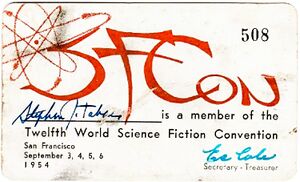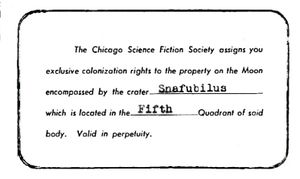Membership
Just as people can be members of clubs, a fan who attends an sf con buys a membership in that con and becomes a member. This terminology — in contradistinction to ticket — emphasizes that fans are expected to be active participants in the activities of a con and not merely passive consumers of entertainment.
In some cases, such as Worldcon and Windycon, convention membership also comes with membership and voting privileges in the sponsoring organization.
The ideal (which is not always met, of course) is that everyone — convention committee, ordinary fans, program participants, artists, hucksters — is working together as a cooperative group to create the convention.
This manifests in a number of ways:
- A single membership provides access to everything (except a banquet if there is one). There are no separate fees for autographs or special access.
- Members are expected to participate in discussions at panels. Part of every panel is devoted to audience participation.
- No one is paid for working on a convention. Everyone provides their time as a free gift to their fellow fans.
Membership fees were originally almost insignificant. The $1.00 fee of the 1940s increased to $2.00 in the mid-’50s, $3.00 in the mid-’60s, $6.00 by 1970. Conventions began a series of time-dependent fee increases that could range from $20 at the cheapest time to $75 at the door of the convention (rates for the 1984 Worldcon).
Many fans found that it was safer to buy a membership at the cheap rate if there was even the slightest possibility of their attending the convention. They could also buy a "Guest of..." membership at that rate just in case they found someone to invite to the con later. If one or both memberships weren't needed, they could probably be sold to latecomers from the local fandom group at a bargain to both purchaser and seller.
Membership Types[edit]
Convention memberships come in various forms:
- Attending. A full member with the right to attend the con and participate in all its functions. At a Worldcon, this includes the right to vote in the Hugos, and Site Selection, attend and vote in the WSFS Business Meeting and do just about anything else. (Typically the only thing not included is any food function such as a banquet that the convention may hold.)
- Pre-registered (aka prereg) or advance. A member of a convention who joined before the convention.
- At-the-door. Someone who showed up and paid during the con.
- Supporting. One who pays a lower fee to be a member without the right to attend the convention. Fans join as supporting members because they want the con publications and voting rights (for awards and site selection, where applicable), and because they want to support the convention.
- One Day. Allows attending only for one day of the con, for a lower fee than a full membership. Other rights depend on the con, but Worldcon voting rights are usually not included.
- Children's. Usually allows the child to attend supervised children’s programming, and may include babysitting services, but typically doesn’t include voting rights.
- Child in Tow and Cuddly Toy (not to be confused with Cuddlypets). These are for beings who won’t use con resources but nevertheless need a name badge so they may be returned to their guardians should they become parted.
Worldcon Memberships[edit]
Historically, for Worldcon, the only difference between the rights of a supporting and an attending member was that the latter had the right to attend the convention and vote at the WSFS Business Meeting. A supporting member got all of the convention publications and could vote for the Hugos and in site selection. Also, a supporting member could normally upgrade to attending member by paying the current difference between the two membership fees.
On the grounds that "supporting" memberships didn't actually support the convention (some cons had priced supporting memberships so low that they didn't even pay for the publications they received), and were only a way of temporizing in case someone decided months later to actually attend, L.A.con II, the 1984 Worldcon, sold “coresponding memberships,” instead. These had the right of receiving publications and of voting, but not of being converted to attending memberships.
Today's Rules[edit]
The 2022 Chicon 8 WSFS Business Meeting ratified an amendment to the WSFS Constitution passed at Discon III in 2021 that did away with supporting and attending memberships to Worldcon.
Beginning in 2023, only annual WSFS memberships are offered. These convey all the rights previously granted to supporting members, such as voting on the Hugo Awards and Site Selection and receiving publications — however, they are not transferable.
WSFS members may then buy tickets attending supplements in order to be allowed into that year’s convention. (These may be transferred, but only to people who already hold WSFS memberships.)
The change was meant to make it so that Worldcons didn’t have to track who had and hadn’t used voting rights before transferring memberships. This has proven to be somewhat controversial in its aftermath, as many Worldcon goers who didn’t pay attention to the Business Meeting for two years found out about it only when purchasing memberships to upcoming Worldcons. Most grumbling is because the change may make it harder to recover costs if you can’t attend and want to sell your membership.
Membership cards[edit]

While clubs often have had membership cards, since some time in the 1960s, conventions have tended to have only name badges. However, for the first few decades of conventions, a membership card, numbered and signed by an officer of the convention, was issued. For Worldcons, these stated the possessor was a member of the World Science Fiction Society.
The custom started to disappear in the ’60s and by the ’70s membership cards were uncommon. (This may have been an effect of the increase in convention sizes. Individual membership cards are more practical for 150-member conventions than for 1,500-member conventions.)
Torcon II in 1973 and Discon II in ’74 issued the cards — we aren’t sure of others after that. The reverse side of membership cards for Chicon 2 in 1952 designated a crater on the moon to which the member was granted exclusive rights.
See also Bid Membership.
| Fanspeak |
| This is a fanspeak page. Please extend it by adding information about when and by whom it was coined, whether it’s still in use, etc. |
